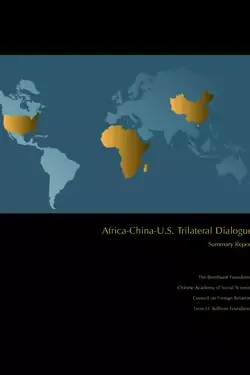
Africa-China-U.S. Trilateral Dialogue
Summary Report

- Report
This report provides insight into a most unique, if not unprecedented, trilateral process.
In mid-2005, the Brenthurst Foundation in Johannesburg, South Africa, sent a letter to Liu Guijin, then China’s ambassador to South Africa, inviting his nation to participate in a process that would include experts from Africa and the United States, to be led by the Brenthurst Foundation, the Leon H. Sullivan Foundation, and the Council on Foreign Relations.
More on:
The Brenthurst Foundation had established the Tswalu Dialogue, which regularly brought together experts from throughout Africa and other regions of the world to discuss issues and trends on the African continent. The Council on Foreign Relations had recently published a study, “More than Humanitarianism: A Strategic U.S. Approach toward Africa,” which found—among other conclusions—that China’s growing role in Africa posed significant issues for policymakers, businesses, and analysts, and should be on the American-Chinese agenda. The Leon H. Sullivan Foundation was established in 2002 to continue the legacy of the Reverend Leon H. Sullivan to deepen ties between the United States and Africa and to promote corporate social responsibility, social justice, and economic development on the continent.
Toward the end of 2005, Ambassador Guijin replied affirmatively that China would very much like to participate in a trilateral dialogue with a group of Africans and Americans. The Chinese Academy of Social Sciences was designated as the Chinese partner institution. The process was born.
The sponsoring organizations agreed to hold three meetings, one each in Africa, China, and the United States, and that the process would be managed by a secretariat with a representative from each delegation. Overall direction of the project and the work of the secretariat would be guided by the chairs of each delegation: William Lyakurwa, executive director of the African Economic Research Consortium in Nairobi, Professor Yang Guang, director-general of the Institute of West-Asian and African Studies at the CASS, and co-chairs of the American delegation Ambassador Princeton Lyman, adjunct senior fellow at the Council on Foreign Relations, and Ambassador Andrew Young, chairman of the Leon H. Sullivan Foundation.
The trilateral basis of the Dialogue put Africa and African views at the center of the discussion of China’s, and in the process America’s, role in Africa. This moved the discussions away from an undue emphasis on Chinese and American competition in Africa and instead on how Africa could gain from the attention of both countries. In the end, the emphasis became how, along with those areas of competition and policy difference that do exist, there could be vital and productive areas of cooperation.
It was gratifying that all three delegations felt that this process was too valuable to end here. The sponsoring institutions will thus be considering, and consulting with others on, how this dialogue can be followed by programs and processes that advance further the ideas and the collaborative spirit that has been generated by the Trilateral Dialogue.
More on:
 Online Store
Online Store